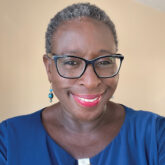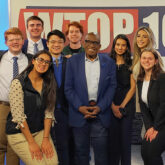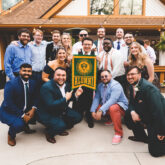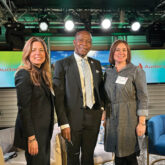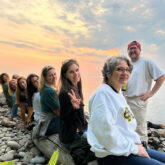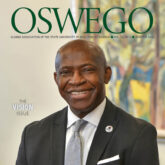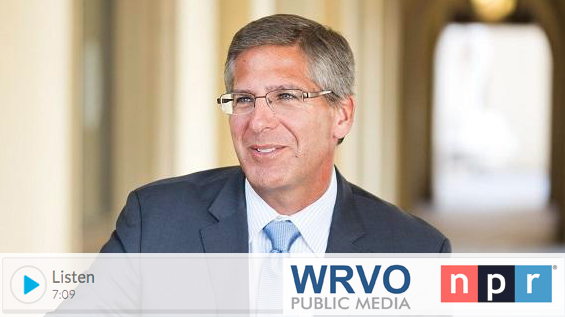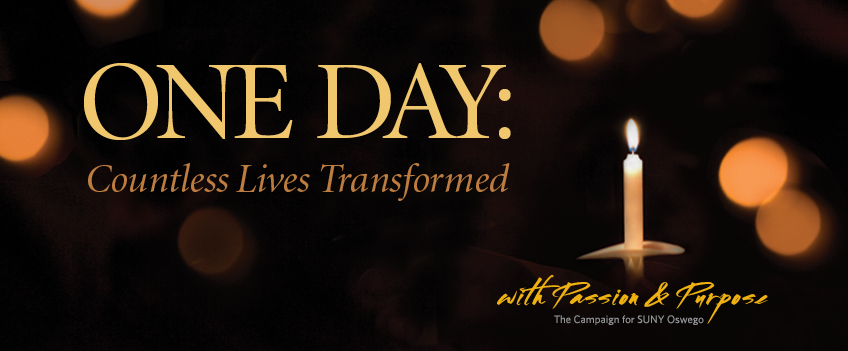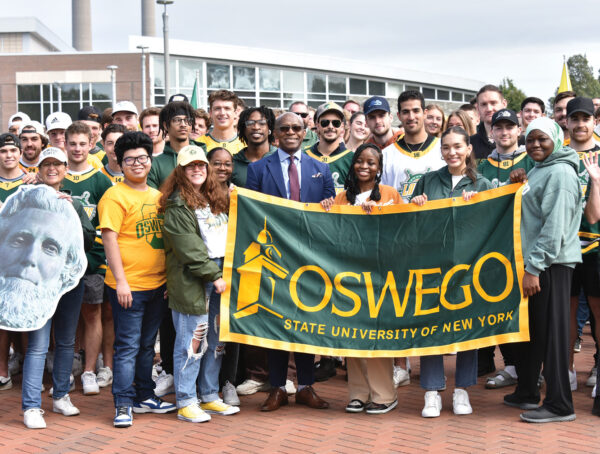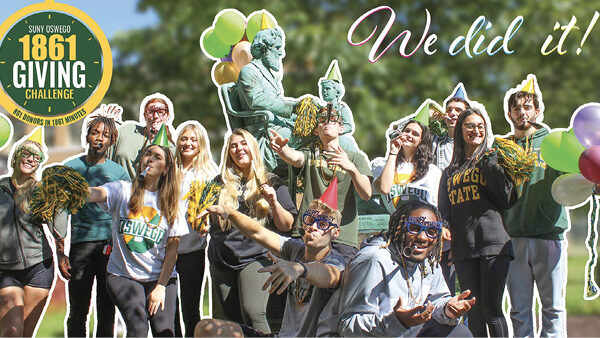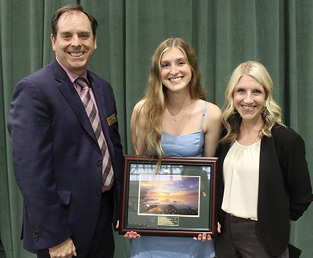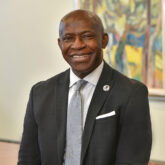Robert Moritz ’85, chairman of PricewaterhouseCoopers (PwC) International Limited, began his Oct. 12 presentation “Global Trends and Building Skills for the Future” at SUNY Oswego with a story about John Major—no, not the former British Prime Minister. It’s a story about John Major, the doorman at PwC headquarters in London.
The prospective client was so impressed with the welcome he received at the company that without hearing the team’s pitch, said he saw what kind of company PwC was and he wanted to work with them. The client ended up bringing millions of dollars of business to the company, thanks to the humility and humanity of John Major, Moritz said.
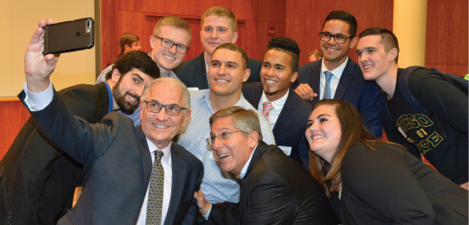
Robert Moritz ’85 (front, center), chairman of PricewaterhouseCoopers International Ltd., posed for a selfie with PwC’s Market Sourcing Leader Mark Bruno (holding camera) and PwC interns and new hires following his Oct. 12 campus presentation in the Marano Campus Center auditorium. Photo: Jim Russell ’83
Grounded in the golden rule of “do unto others,” Moritz turned his presentation to a discussion of five “megatrends,” which he and his company have been tracking for years:
• Shift in global economic power
• Rapid urbanization
• Demographic and social change
• Resource scarcity and climate change
• Technological breakthroughs
He outlined these same five areas during a 2014 presentation on campus, but he said the changes are occurring faster than he predicted. He discussed how five other factors were amplifying the impact of the megatrends:
• Asymmetry—disparity between the haves and have-nots (Eight people hold more wealth than 3.5 billion people, he said.)
• Disruption—business models changing and the blurring of industries (For example, cars that can not only drive themselves, but also tell us we are having a medical emergency based on biosensors.)
• Age—demographic pressures on business and social institutions (The average age in Japan and Germany is around 46 years old, and in Africa, it is 18 years old.)
• Populism—breakdown of global consensus and an increase in nationalism (Countries that are used to being in power are trying to protect their interests and long for the world they used to have.)
• Trust—declining trust in institutions and technology (People need time to assimilate to technological changes; life is moving too fast.)
“Megatrends are real and they are impactful,” Moritz said.
He explained each area with examples and showed how they relate to each other. He said that eight out of 10 job losses are due to technology, not to trade agreements. But he also pointed out that as new technological capabilities replace the need for humans in one area of work, the advances also create new opportunities for those displaced workers—who will need to be retrained. Education is a lifelong process.
He shared a list of the most important skills to have for the future workplace, and the list included a lot of “soft skills” such as adaptability, problem-solving, collaboration, emotional intelligence, creativity and leadership.
Moritz encouraged students to become storytellers who can explain how their experience and skills from one career relate and can be applied to a different position.
“The world of possibilities before you is great,” he said. “Don’t plot out your life too far, too fast.”
Following his remarks, he fielded questions from audience members as well as viewers who were watching the live webstream. Tying back to the theme of his opening story, he asked each questioner to say who they are, where they are from and their favorite vacation.
Moritz shared personal stories of how he almost decided to skip college to continue earning money working in the stockroom of a women’s clothing store, how he developed communication and interpersonal skills as a residence assistant in Cayuga and Scales halls, how his favorite vacation pulled together 25 friends for a secret weekend getaway, and how he has enjoyed being an “enabler” and investing his time in relationship-building.
“You’ve got to have some fun in this world,” he said. “Your friends and family … make sure you say thank you to them. Take care of them and make sure you invest in relationships … Work is worthwhile because it has enabled me to live; but work is not life.”
Although some of the trends he presented were unsettling, Moritz ended his presentation with an inspirational charge to students.
“You will make that world friendlier,” he told students. “You will make that world successful. It’s full of potential. It’s full of opportunity, but it’s on your shoulders as you walk out these doors today.”
WRVO Interview: The economy, diversity, and preparing students to enter the workforce
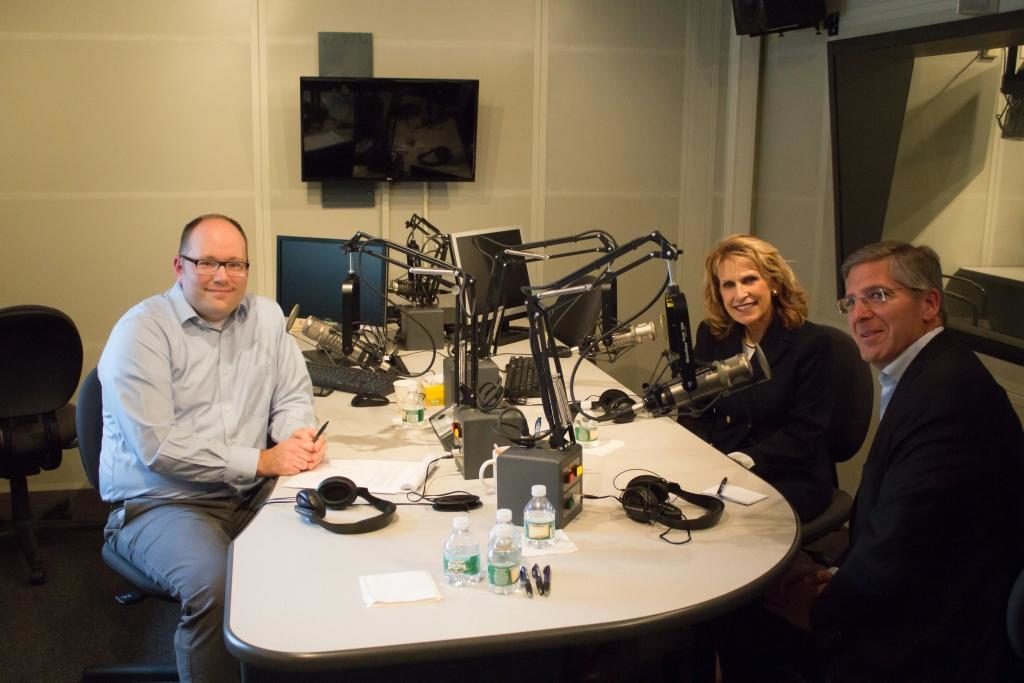
PwC global chairman Bob Moritz (right) and SUNY Oswego President Deborah Stanley (center) talked with WRVO’s Jason Smith (left). Photo: Matt Cummins
You might also like
More from Campus Currents
University Celebrates Third Annual Founder’s Weekend
University Celebrates Third Annual Founder’s Weekend Several hundred members of the Laker community gathered together on campus to learn about the …
SAVAC Captain, Biology Major Named 2023 Outstanding Senior Award Winner
SAVAC Captain, Biology Major Named 2023 Outstanding Senior Award Winner Shannon Harris ’23, a biology major from Webster, N.Y., was selected …

